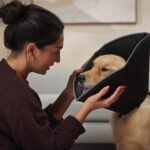What To Do When Your Puppy Has Diarrhea (Sorry!)

Photo by urbazon/iStock/Getty Images Plus
Hey, poop happens. It’s just part of the deal when you become a pet parent. But when the topic turns from normal puppy poop to diarrhea in puppies, there are questions you may have and things you need to know.
Diarrhea is not uncommon when it comes to puppies and can be caused by the stress of a new situation, viruses, parasites or changes in diet or lifestyle. Mild cases can likely be treated at home, but more severe cases of puppy diarrhea can be a serious problem. Here is what you need to know.
If you suspect your pet is sick, please call your vet immediately. For health-related questions, always consult your regular veterinarian when possible as they can make the best recommendations for your pet.
Causes of Puppy Diarrhea
Puppies can develop diarrhea for a number of reasons, some of which are more serious than others. Let’s look at some of the most common answers to the question: Why does my dog have diarrhea?
Internal Parasites
Parasites within the gastrointestinal tract (GI) are one of the top reasons for new puppy diarrhea. GI parasites can range from worms you can sometimes see in the stool to protozoa and coccidia, which can only be seen with a microscope. Worms may not appear themselves either, but their eggs are usually present in the stool. These parasites are why a fecal examination is one of the first tests a veterinarian will run on a puppy with diarrhea.
Dogs tend to develop some natural resistance to intestinal parasites as they age, but puppies are generally at their mercy. These parasites drain nutrients from a puppy and may cause symptoms like:
- Slow growth
- Poor-quality coat
- Pot-bellied appearance
- Diarrhea
- Vomiting
Food Reactions
Try to think of any unusual foods that your puppy could have eaten in the day or two before they started experiencing diarrhea. Did they just start a new food or different type of treat? Did you have friends with small children visiting who might have snuck them some extra snacks? Did you give them something special off your own plate?
Anything new to your pup can cause GI upset and diarrhea, and some foods, like those that are very fatty and human foods that are toxic to dogs, can be even more dangerous.
Puppies can also develop allergies or intolerances to certain ingredients in their diets.
Eating Something Dangerous
You also have to think beyond traditional food items. Puppies explore with their mouths. A curious puppy might eat a pesticide out of the garden, chew on some toxic flowers, swallow a piece of plastic or turn over a garbage can. Puppies like to check out anything they can find both indoors and outside. All sorts of toxins and foreign bodies that are swallowed can lead to soft stools or watery diarrhea in dogs.
Bacterial Infections
Dogs typically develop bacterial infections within their gastrointestinal tracts as a result of eating contaminated food or drinking contaminated water. Salmonella, listeria, clostridium, E. coli and other bacterial species can all lead to puppy diarrhea and other serious symptoms.
Viral Infections
Parvovirus is the most notorious viral infection that causes diarrhea in puppies. Spread by direct dog-to-dog contact and contact with contaminated feces, environments, or people, it is often fatal without appropriate treatment.
Other viruses that can lead to diarrhea in puppies include canine distemper virus, canine adenovirus-1 and canine coronavirus (not related to the coronavirus that causes COVID-19).
Stress
Finally, something as simple as stress can upset a puppy’s delicate digestive system and lead to diarrhea. Puppies thrive on routine, so to the greatest extent possible, stick to a schedule with your pup and make any changes that must occur gradually.
These are just some of the more common causes of puppy diarrhea. The good news is that if your pup is just stressed out or ate something unusual, their diarrhea will probably resolve in 24-48 hours, but definitely talk to your veterinarian if their loose stools persist longer than that or are combined with other worrisome symptoms.
The Dangers of Puppy Diarrhea
Remember, puppies are small and don’t have as many reserves as more mature dogs to help them through a health issue. If your puppy has runny stool, particularly in combination with vomiting or a poor appetite, they can go from happily playing to down and out very quickly. Knowing what to do if your puppy has diarrhea is essential.
If your pup has any of the following risk factors, call your vet or an emergency on-call veterinarian immediately:
- Young puppy (under 4 months of age or so)
- Toy breed puppy
- Vomiting in addition to diarrhea
- Bloody diarrhea
- Abdominal pain
- Weakness
- Lethargy
- Poor appetite
- Gums that are pale or tacky to the touch, which can indicate dehydration, anemia or shock
- Watery poop that lasts for more than a day
Deciding Whether To Go to the Veterinarian
A puppy with diarrhea almost always warrants a call to your veterinarian. At the very least, this will get you individualized guidance on what home therapies you can try and what doses to give your pup. Puppies metabolize many medications differently than mature dogs, so dosage adjustments may be necessary.
When a puppy has loose stool, talking to a veterinarian can also help you determine whether a trip to the hospital is needed.
Treatments that are often needed in more severe cases of acute diarrhea include:
- Fluid therapy to treat dehydration— given under the skin or intravenously
- Medications to slow down the bowels and reduce diarrhea and fluid loss
- Medications to manage vomiting
- Antibiotics to treat or prevent a bacterial infection arising from within the gut
- Hospitalization and close monitoring for extremely sick puppies
Your veterinarian can also run tests to determine why your pup has diarrhea—a fecal examination for parasites or a test for parvovirus, for example.
Not sure whether to see a vet? Use PetMD’s Symptom Checker. Answer a few questions about your pet’s symptoms, and the vet-created online tool will give you the most likely causes and next steps.
What To Do When Puppy Diarrhea Happens
If you’re headed to the veterinarian’s office, try to bring a stool sample with you. Scoop up some diarrhea and seal it tightly in a plastic bag or container. If you see a parasite or incriminating evidence like a chewed piece of plastic, make sure you bring that, too.
Don’t bathe your pup—you don’t want them to get chilled—but you can wipe off the worst of the mess with a dry towel before leaving for the clinic.
But what if your veterinarian says it’s safe to try some home treatment for your puppy’s diarrhea? Always follow your vet’s specific instructions, but this is often what helps dogs with diarrhea:
- Start by encouraging your dog to drink. Puppies, especially those really young and really small, can dehydrate quickly. Make sure your puppy has access to fresh water at all times. Bring it to them if necessary. You can also try using a water fountain, like the Frisco Whimsical Leaf Fountain.
- Entice a reluctant drinker by adding some low-sodium bouillon to the water or a few drops of liquid from some tuna canned in water. Pediatric hydration fluids for human babies work well, too, if your pup will drink them.
- Stick to bland food. This might be boiled, unseasoned hamburger or white meat chicken with some rice or a prescription diet for intestinal problems that you can get from your veterinarian. When your pup’s diarrhea has resolved, take a few days to gradually switch back to their regular diet.
- Check with your veterinarian to see if you can give any supplements or over-the-counter medications, like canned pumpkin, kaolin-pectin or probiotics.
Puppy Diarrhea FAQs
Why does my puppy have diarrhea?
The reasons why your puppy has diarrhea could include a change in diet, eating something unusual, exposure to toxins, viral or bacterial infections, food allergies or intolerances, intestinal parasites, stress, and other potentially serious health problems.
What to give dogs for diarrhea?
Pet parents have to be careful in what they give for dog diarrhea—some over-the-counter treatments are dangerous if used incorrectly or in the wrong situations. If the diarrhea is mild and not associated with a serious health problem, it may respond to a bland diet (boiled white meat chicken and rice, for example) and extra water intake. Your veterinarian can let you know whether it is safe to give your puppy canned pumpkin, kaolin-pectin, probiotics and other supplements or medications.
How long does puppy diarrhea last?
Puppy diarrhea can last for just a few hours, or it may persist for days or even longer. Always talk to your veterinarian if puppy diarrhea lasts for more than a day or two or if it is associated with vomiting, lethargy, weakness or any other symptoms of disease.
Does puppy teething cause diarrhea?
Many pet parents report that puppy teething seems to be associated with diarrhea. However, diarrhea during this time can still be serious enough to require veterinary care. Teething puppies will often chew on and swallow almost anything they can get their mouths on. Also, the immune systems of young puppies who are teething are not yet fully formed, so they are at higher risk for the bacterial and viral infections that can cause diarrhea.
Is blood in my puppy’s diarrhea an emergency?
Anything but the smallest amount of blood in a puppy’s diarrhea should be seen as an emergency. Call your veterinarian immediately for advice.
Why does my puppy have diarrhea after changing food?
Your puppy can have diarrhea after changing food because it takes time for a dog’s GI tract to adapt to new ingredients. Whenever possible, make dietary changes over the course of a week or two. It is also possible that your puppy has a food allergy or intolerance to an ingredient that is included in the new food but that wasn’t in the old food.




